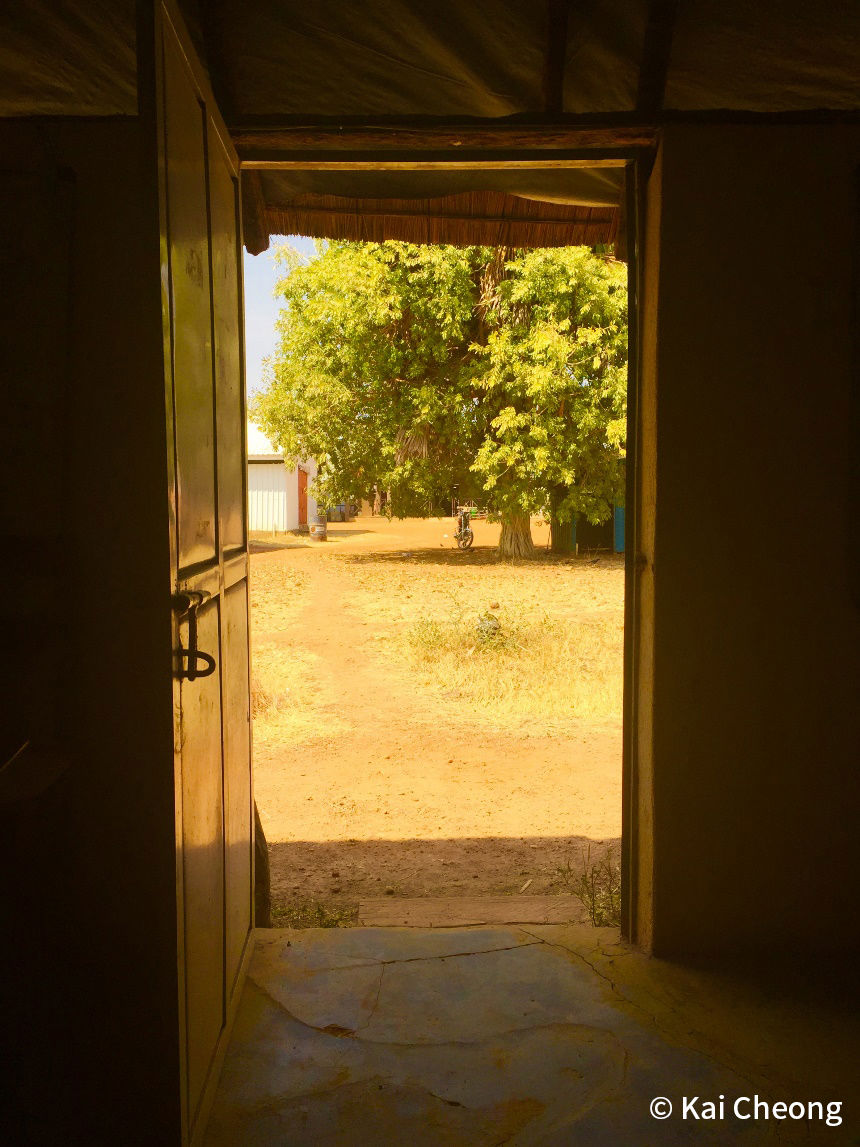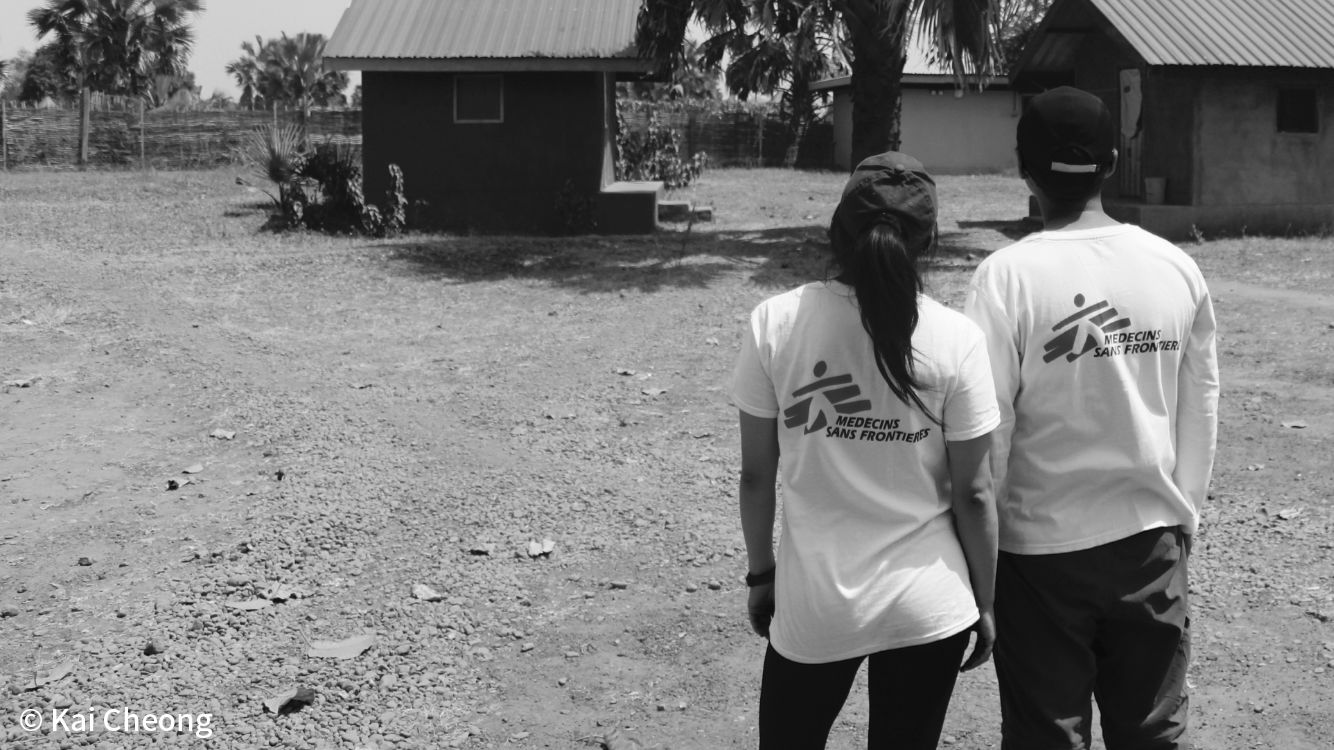The mornings begin with stepping out of my tukul (mud hut), blinking sleepily against the brilliant violets and roaring oranges of an African sunrise. The glorious glow illuminates the sharp rays of towering palm tree fronds, ripe with heavy and sweet oval fruit that tastes like mangoes. The shadows of flocks of songbirds flit from tree to tree, metallic blue bodies shimmering in the early morning light, chirping cheery melodies with whoops and whistles. A gentle zephyr sings through the leaves, rustling them like pepper cracking in the heat of a pan. Our chilli plants, pink daisies and purple rhododendrons turn their faces to the sun.

In the dry season, days are a constant burning heat, and bone-dry. The red dust of this savannah covers everything within minutes, from my parched lips to my boots. The token white MSF T-shirt, painstakingly washed free of dirt with limited water by our laundry ladies, stays clean for a total duration of 2 minutes. As I head to our pit latrine (basically a deep hole in the ground functioning as our outhouse toilet) for my morning libations, swirls of dust rise with each step. And after a full day of me stomping frustratedly around the compound, my clothes are sweat-soaked and coated in muddy red dirt. The laundry ladies shake their heads and throw their hands in the air at how impossibly dirty I can get within one day. There is some mystifying local secret to staying clean here that eludes me. The tall and svelte Dinka women sway elegantly through the trees; their long limbs covered in clean-pressed and brilliantly-colored robes shot through with threads of red, yellow, green embroidery. Tribal necklaces circle their long necks in intricate beaded patterns, tribal facial tattoos glistening in the sun with sweat.
For a country still at conflicts between the main Dinka and Nuer tribes after separation from North Sudan in 2011, Gogrial town (the former capital of Warrap state), has largely been spared the ongoing conflict. The majority population here is Dinka, and the only brief period of tense fighting in May 2014 between Gogrial East and West, was due to local conflicts over cattle raiding and ownership. The military still has presence here and armed soldiers patrol the marketplaces, but individual disarmament due to security fears has been a huge difficulty. Everyone carries a kalashnikov, and drunken random shootings occur in the town during the night, but we are relatively safe from harm within the MSF compound. Our presence here is largely welcomed and respected, as we are the only organization providing 24 hour medical care and services to a neglected population, trying to handover to the local ministry of health, which only runs basic primary clinics in the area.
Fears of insecurity have mostly abated since my first few days. So far I have suffered no grievous bodily injury, I have not been attacked by snakes or large mammals, or beset by poisonous scorpions. So far I have only been hit on the head by a humongous falling mango, and suffered a mild concussion. But there has been no other need for a medical evacuation, no thanks to the beady-eyed hawks whom swoop down from the sky to try and snatch bread from your hand, and rake you with their talons.
The large compound sits in the middle of Gogrial village, and contains the hospital and living quarters for the expats / trained relocated staff from the capital Juba. We are completely encircled with a tall bamboo fence and cement posts for security reasons. Just on the other side of the fence all around us are tukuls of the villagers, so close and yet so invisible beyond the wall.
I swear that a huge animal pen is right opposite my window at the edge of the compound, for often cats squeal, dogs howl, and roosters crow voluminously throughout the night. There is one particular rooster that doesn't know the time, and goes on for hours until noon.
On difficult days I am preoccupied with thoughts of scaling the fence to capture this one rooster, so we can have chicken for dinner for a change. But I am told we are only allowed to kill the husband of the chickens to commemorate special occasions such as birthdays…There is some flour and rice available for purchase at high cost of inflation at the market here, but most staples have to be flown in from Juba on MSF cargo planes. The extensive menu here is rice and beans, beans and rice, and different portions of beans with different portions of rice... but then one thinks of the hunger right over the fence, and the fact that many children are but skin and bones from severe malnutrition.
One learns to be grateful for very little.
The multitude of wildlife roaming freely in the brush of the compound is astounding. Calico kittens leap from our shelves and onto our tables; chase each other under patient's beds from one end of the wards to the other, screeching as their paws skitter over the floor. Lean wild dogs paw at the earth under our fence, and slink between our tukuls in the dead of the night, scavenging for food in our rubbish. Beetles, bulbous black ants and flies find their way onto our bodies, but are otherwise harmless. Hornets hover nervously over our laptops, an ever present threat of a betraying sting. Sometimes vultures circle above and perch high amongst the leaves, just waiting and watching. eerily. There is a paradox of veiled disquiet and danger, a metaphorical undertone of tension in this facade of peaceful paradise, but it is offset by the fascinating and complex humanity that inhabits this same space.
Although I cannot see well through the gaps of our perimeter, the faceless village children come and crowd around their side of the fence to peer at me and shout "Hello Kawaja! How are youuuuu?”. Every non-Sudanese person here is a Kawaja, a white person, and I am the only Asian face some of them have seen. They stretch their eager fingers through the cracks in the fence to touch the contours of my face, and we laugh at each other until I bid them goodbye, until the same time tomorrow.
Ah, the simple beauty of this idyllic rural paradise is endearing. It is easy sometimes to be lulled into forgetting the real amount of brutality, cruelty, blood and suffering this land and its people have seen, and are still experiencing.
(To be continued)
Continue to read Gogrial - Paradise of kindness and brutality (2)



